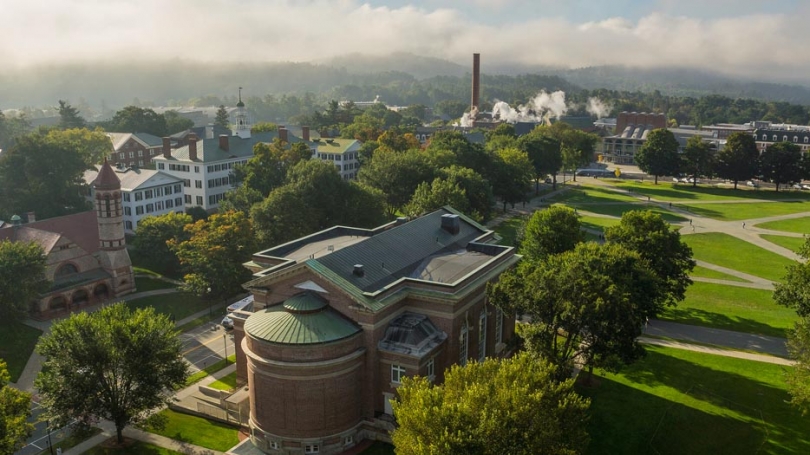
Jacqueline Lisa Christie will be graduating from MALS this Spring
Headlines across US media highlight the number of Black Americans killed by police. They outline Black Lives Matter Protests; they present rhetoric from an US President that degrades Blacks, immigrants, Mexicans, and Muslims; others discuss issues in Native American spaces such as Standing Rock. Rarely do these headlines speak about incidences in Vermont and New Hampshire, making it easy to think that racism only exists elsewhere, and that people of color do not experience difficulties here.
In pursuit of my Master of Arts in Liberal Studies (MALS), I was honored to interview 27 people of color in the areas surrounding Dartmouth (Hanover: 81% white) and Middlebury (Middlebury: 86% white) Colleges to hear their experiences of living in white spaces: areas where Black people and other people of color are often not present or exist in a limited number, and where they are subject to arbitrary social expectations and heightened scrutiny. Their stories, resulting in an oral history, illustrate that being a person of color in a predominantly white space is fraught with daily negotiations and frequent trauma.
My research, under the guidance of Professor Julia Rabig whose research encompasses African American History, urban and gender studies and globalization, uses oral histories to explore how people of color experience life in majority white spaces.
These oral histories provide an opportunity to hear from people who often chose not to share their stories because they feel they cannot do so and still keep their job, get a good grade, or coexist with whites. They explore how the reality for people of color differs from what whites perceive and also what might be required to bridge this gap.
The stories uncover the subtleties of racism in predominantly white spaces, allowing us to name what is encountered and acknowledge its impact. This work is instructed by research around identity, racial identity, historical aspects of race, contemporary politics, and literature. It provides an opportunity to address the complicated and emotional nature of race in this country, grounded in the white spaces of Northern New England.
The interviewees’ insights about difficulties for people of color at Middlebury and Dartmouth Colleges for were confirmed by headlines in the summer of 2018. During the last week of August, Vermont’s sole African American state legislator, Kiah Morris, resigned due to multiple violent threats, a home break-in, and swastikas painted near her property. Morris said “the constant harassment was like ‘death by a thousand paper cuts’, making her want to ‘rationalize it away, and look for the escape route from the ugly truth about it all’” (Flynn, 2019). Morris’s resignation followed incidences where children of color participating in a camp in Stowe, VT were subjected to racial slurs during their outings and treated in an unfriendly manner by staff at the resort where they were staying.
Further demonstrating the fraught nature of discussions about race, with the exception of one teenage boy, interviewees spoke only if they could do so anonymously—a complicated proposition in Northern New England, where people of color are scarce. To help ensure anonymity, I expanded interviews beyond Dartmouth to include Middlebury. Even with two locations, anonymity means only the briefest of descriptions of participating individuals could be allowed in the research, and that all identifying remarks be stripped. All interviewees cautiously selected their words and phrases. Exhibiting more caution, many stories were shared only after the recorder was turned off, and with the understanding I would not use them. Even censored, the stories describe tales of a Black man being chased by white men with guns, of being “petted” at a grocery store, of loneliness, never quite belonging, and subtle actions resulting in diminished experiences.
The caution of the interviewees illustrates the difficulties people of color face in white spaces, as well as how difficult it is to address race in America. In turn, their thankfulness that someone was asking them questions reflects how rarely white people ask for stories from people of color and illustrates how important it is to keep trying. These voices deserve to be heard; their individual stories are significant in their own right and illustrative of the larger issues surrounding race in white spaces.
I am forever humbled that interviewees trusted me to hold their stories. I recognize my own whiteness is not incidental to this research, but an important factor in which stories were shared and how they were told. I also recognize that as a white person, my privilege allows me to be angry about these issues without being dismissed as another overly sensitive person of color.
I thank all the interviewees for their honesty, their help, and their good wishes. I hope I have done their experiences justice.
I also thank the Alumni Research Fund. The Fund’s generosity allowed me to hire a service to transcribe over 40 hours of interviews. This meant instead of transcribing, I could analyze these stories, allowing me to finish my thesis this summer and start working, with a small grant and Northern Stage staff, on turning the stories into a play.
References
Flynn, M. (2019, January 19). White nationalist’s harassment led a Black female lawmaker to resign. He won’t face charges. The Washington Post. Retrieved from https://www.greensboro.com/news/national/white-nationalist-s-harassment-led-a-black-female-lawmaker-to/article_add7b955-e23b-5a3b-8eb1-530ccd92c1f8.html
Johnson, M. (2018, August 16). After unsettling week and racial slurs, parents say camp won’t be back.The Vermont Digger. Retrieved from https://vtdigger.org/2018/08/16/unsettling-week-racial-slurs-parents-say-camp-wont-back/